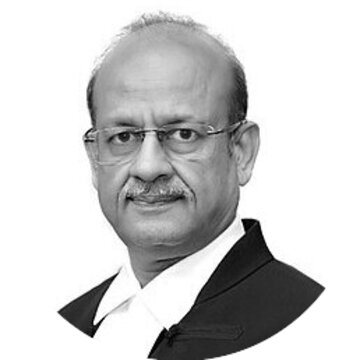Rajesh Bindal

Rajesh Bindal
Sitting Judge of the Supreme Court of India
Assumed Office13th Feb, 2023
Retires On15th Apr, 2027
Previously
Chief Justice of Allahabad HCOctober 11th 2021 - February 12th 2023
Acting Chief Justice of the Calcutta HCApril 29th 2021 - October 10th 2021
Judge of the Calcutta HCJanuary 5th 2021 - April 28th 2021
Acting Chief Justice of Jammu and Kashmir HCDecember 9th 2020 - January 4th 2021
Judge of the Jammu and Kashmir HC November 19th 2018 - December 8th 2020
Judge of Punjab and Haryana High Court March 22nd, 2006 - November 18th 2018
Profile
Early Life
Justice Rajesh Bindal was born on 16 April 1961, in Ambala City, Haryana. He completed his early education in his hometown of Ambala. He then pursued his undergraduate studies in commerce at Punjab University, Chandigarh. Subsequently, he earned a law degree from Kurukshetra University in 1985.
Career as an Advocate
Justice Bindal enrolled as an advocate on 14 September 1985 and began practising at the Punjab and Haryana High Court. His area of focus was in taxation, constitutional, civil and service matters.
At the High Court, he served as the standing counsel for the income tax department for Haryana. He appeared for the Employees Provident Fund Organisation of the Punjab & Haryana regions. In addition, he also represented the Chandigarh Administration before the Central Administrative Tribunal for more than a decade until 2004.
Justice Bindal was involved in the Satluj Yamuna Water dispute between the states of Haryana and Punjab. He represented the State of Haryana in settlement proceedings before the Eradi Tribunal and the Supreme Court.
Career as a Judge
On 22 March 2005, Justice Rajesh Bindal was elevated as a Judge of the Punjab and Haryana High Court.
He served as the Chairperson of the Computer Committee which played a crucial role in developing various software solutions for judicial efficiency. One of them was the Medico-Legal Examination and Post-Mortem Reporting System (MedLEaPR) software, which facilitated the computerisation of Medico-legal reports (MLRs) and Post-mortem reports (PMRs). This system was mandatorily implemented in Punjab, Haryana and Chandigarh on 3 December 2012. The software has since been adopted by several other states, including Rajasthan, Madhya Pradesh and Himachal Pradesh.
He served as Chairman of another multi-member Committee constituted by the Ministry of Women and Child Development to study Civil and Legal Aspects of the International Child Abduction Bill, 2016, and Inter-Country Removal & Retention of Children.
On 19 November 2018, Justice Bindal was transferred to the High Court of Jammu and Kashmir. He headed a committee which looked into the use of technology and Artificial Intelligence by the National Legal Services Authority. He was also a member of the Committee which looked into the existing Lok Adalat framework and how to fill the gaps for better application of the ADR mechanism for the weaker sections of society.
On 8 December 2020, he was appointed as the Acting Chief Justice of the High Court for the Union Territory of Jammu & Kashmir and Ladakh.
In January 2021, he was transferred to the Calcutta High Court. Following the retirement of Chief Justice T.B. Radhakrishnan, he was appointed as the Acting Chief Justice of the Calcutta High Court, with effect from 29 April 2021.
On 11 October 2021, Justice Bindal took oath as the Chief Justice of the Allahabad High Court.
On 31 January 2023, Justice Bindal was recommended for elevation to the Supreme Court by the Collegium led by Chief Justice D.Y. Chandrachud. He took oath on 13 February 2023.
Notable judgements
In Parminder Singh v Honey Goyal (2025), Justice Bindal, authored a judgement, which enhanced a compensation of ₹15.25 lakh granted for a motor accident to ₹36.84 lakh. The judgement noted that a substantial amount of compensation remained pending at the Tribunals as many claimants did not approach the Tribunals to make the claim. The Bench directed that an alternative would be to compensate the victims directly to their bank accounts instead of the Tribunals. This way compensation can be disbursed “without delay”.
In Jyostnamayee Mishra v State of Odisha (2025), Justice Bindal dismissed an appeal where a Peon sought the position of a Tracer through promotion. The Bench noted that litigants cannot claim negative discrimination by approaching the Courts seeking directions that would violate statutory rules.
In Property Owners Association v State of Maharashtra (2024), Justice Bindal was part of a nine-judge Constitution Bench which, in a 7:2 majority, held that not all private properties can form a “material resource of the community” under Article 39(b). He was part of the majority verdict authored by then CJI Chandrachud.
In Shazia Aman Khan v State of Orissa (2024), Justice Bindal set aside an Orissa High Court judgement which had transferred the custody of a 14-year old child from her aunt to her father. The Bench noted that the child was capable of forming her own opinions and wished to continue to stay with her aunt, where she had stayed ever since she was three to four months old. Moreover, the bench found that it was in the “best interest” of the child to continue staying with her aunt.
